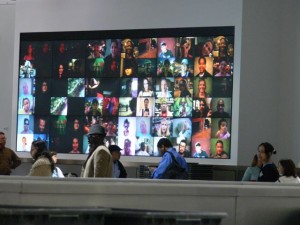Last Thursday’s Talk n Tech event at the MicrosoftStore in The Village (Corte Madera, CA) was a real eye-opener for me. And judging by the expressions and comments of the parents who came by to meet me and see what’s going, the same was true for them. I love technology. Especially for the ease with which it connects us and equalizes our access to information.
That said, I’m not a techie. I’m a people person. And visiting the tech stores I’ve been to in the past hasn’t been all that much fun. But I’ve got to say that it felt really good to be in the Microsoft Store, and it wasn’t because I received compensation related to the event and to this post. Nope. I felt comfortable in the space because the folks who work at the store were so welcoming. Tea was offered! Along with nice wooden stools to sit on. One of my biggest surprises was learning how a Microsoft Store can be used by community groups for meetings and presentations at no charge! More than a store this felt like a 21st century community learning environment.
Beyond the latest in technology, what else could be learned in this space? After a tour of the store and an impressive demo of Surface Pro 3, five people and I were treated to lunch at The Cheesecake Factory, and we tackled that question. The conversation around the table was so dynamic and insightful, I wish we had recorded it for posterity! We parents talked openly about the benefits of technology in the lives of our kids and families. We also shared our genuine concerns about content, access, balance, and guidelines for helping kids develop personal standards for their online behavior.
Big questions came up around the table, without concrete answers… yet. But the questions themselves are instructive, and they spotlight areas that most parents can relate to. For example:
1. How do I keep my kid safe(r) online? Kids are wired to push boundaries and take risks. Parents are wired to keep kids safe and to help them learn to keep themselves safe. “Spyware” doesn’t help kids develop good judgement. And “just say no” isn’t effective parenting. Our job must include helping them identify what it means to be a responsible digital citizen and why their choices matter, online and off.
2. How do I teach my kids to self-monitor and self-regulate without my having to play “Computer Cop” 24/7? Social media is the vortex where Character Development battles with Peer Approval Addiction. Social media is often a highly emotionally charged environment with no boundaries. What’s a parent’s role in preparing our kids to inhabit this digital landscape?
3. How do I personally fight my own connection addiction so I can model what I preach and my family can establish a healthier balance between screen-time and unplugged time? What do I do when my kids push back… hard?
4. After I’ve ’snooped’ and discovered my child has crossed the line… how do I have conversations that will help him/her a) manage those knee-jerk destructive emotional responses and b) get my voice inside his/her head to help my child to think more clearly when I’m not around.
Hopefully, what was begun will spark more discussion. The Microsoft Store and the technology there will definitely make having those conversation a lot easier.













